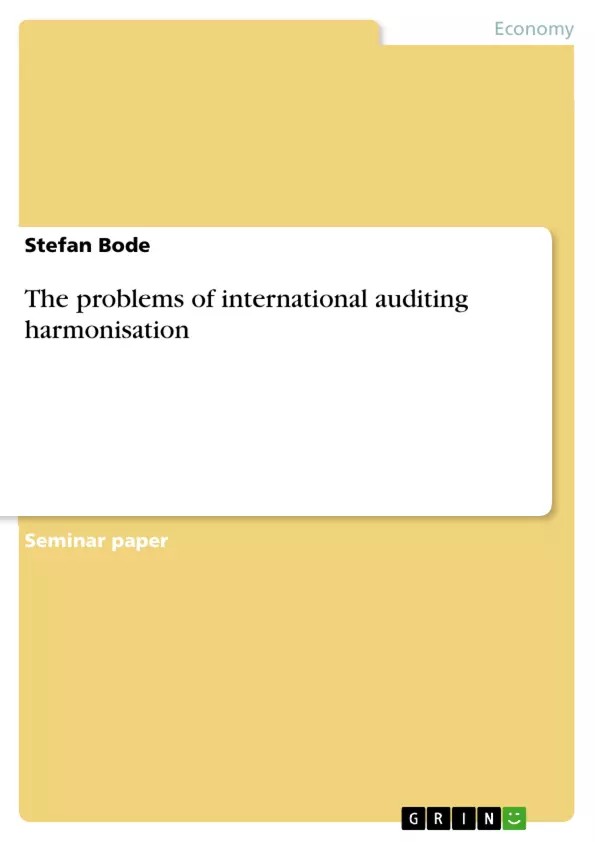This essay provides an analysis of the many hurdles in the process of truly harmonised international auditing standards. The method of analysis for this essay included a review of the current literature available in libraries and on the internet.
The cultural barriers are regarded as the most difficult to overcome since they comprise of people’s behaviours as well as languages. Further, it is stated that the translation process is one of the major hurdles since words in different languages are not equivalent to the English ones. Moreover, cultural diversity may also cause a general resistance as the standards are dictated by big audit firms. Additionally, the IFAC is mainly influenced by the USA and the EU which might continue to cast a damning light on the ISA.
Alternatively, the level of education and the lack of professional auditing bodies in some developing countries embody the social problems. The political hurdles contain the pride of sovereignty and the political system of countries. Additionally, governments are reluctant to abandon their right to prescribe the standards for professions. Furthermore, it will also be difficult to find a majority in the national parliaments because current national standard-setters or representatives from businesses might exert pressure on the members of parliament to reject ISA.
On the other hand, differences in national legislation as well as in the legal system are the main part of legal obstacles. Nowadays, a marked distinction can be drawn between the common law which is predominant in Anglo-Saxon countries and the codified law which is applied in many European continental countries. Beyond this, differences in the effectiveness of countries legal structure and national regulations like auditors’ liability, accounting rules also adversely impair the harmonisation process.
Lastly, the economic hurdles are characterised by different user orientation of financial statements and the stages of technological developments. Further, auditors in developed countries need other standards as their counterparts in developing countries due to the growth of e-commerce and e-business.
Finally, it is concluded that truly harmonised standards may not be feasible because of the many differences between countries. It seems more important to achieve a minimum set of international auditing standards as unitary standards generate many benefits.
Table of Contents
- Executive Summary
- Introduction & Background
- Problems of Harmonisation
- Cultural Obstacles
- Social Obstacles
- Political Obstacles
- Legal Obstacles
- Economic Obstacles
- Conclusion
Objectives and Key Themes
This essay critically examines the challenges of achieving true harmonisation in international auditing standards. It aims to identify and analyse the significant obstacles that hinder the convergence process, ultimately exploring the feasibility of truly harmonised standards.
- The difficulties of achieving true harmonisation in international auditing standards.
- Cultural barriers to harmonisation, including language differences and diverse auditing practices.
- Social obstacles, particularly the lack of qualified auditors and professional auditing bodies in developing countries.
- Political hurdles, such as national sovereignty concerns and resistance from national standard-setters.
- Legal obstacles, encompassing differences in national legislation, legal systems, and auditors' liability.
Chapter Summaries
The essay begins by outlining the ongoing challenges of harmonisation in international auditing standards despite the development of the International Standards on Auditing (ISA). It then delves into five key problem areas: cultural, social, political, legal, and economic obstacles.
The chapter on cultural obstacles highlights the complexities of language translation and differences in auditing practices across cultures. It also discusses the influence of large audit firms and the potential dominance of US and EU perspectives in shaping the ISA.
The chapter on social obstacles focuses on the impact of education levels and the lack of professional auditing bodies in developing countries. This poses challenges for the effective implementation of ISA, as qualified auditors may be scarce.
The chapter on political obstacles examines the challenges of national sovereignty and political resistance to adopting ISA. It argues that national pride and the reluctance to surrender control over professional standards can impede harmonisation efforts.
The chapter on legal obstacles emphasizes the differences in national legislation and legal systems, particularly the distinction between common law and codified law. This divergence in legal thinking and court decision-making processes further complicates harmonisation.
The chapter on economic obstacles explores the varying user orientations of financial statements and the impact of technological developments. It suggests that the needs of investors in developed countries and developing countries may differ, potentially leading to diverging auditing standards.
Keywords
Key terms and concepts central to this essay include: international auditing standards, harmonisation, cultural obstacles, social obstacles, political obstacles, legal obstacles, economic obstacles, International Standards on Auditing (ISA), International Federation of Accountants (IFAC), common law, codified law, auditors' liability, and user orientation of financial statements.
- Quote paper
- Stefan Bode (Author), 2007, The problems of international auditing harmonisation, Munich, GRIN Verlag, https://www.grin.com/document/70049



